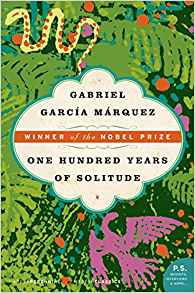 100 Years of Solitude is a story about the Buendía family, whose patriarch founded the town of Macondo and whose line has been condemned to “one hundred years of solitude.” The curse spans from the original marriage of the family’s patriarch, Jose Arcadio Buendía, to Ursula Iguaran, his first cousin. The “curse” is multifaceted, manifesting in a few different ways throughout the story, but especially through a theme of circular time.
100 Years of Solitude is a story about the Buendía family, whose patriarch founded the town of Macondo and whose line has been condemned to “one hundred years of solitude.” The curse spans from the original marriage of the family’s patriarch, Jose Arcadio Buendía, to Ursula Iguaran, his first cousin. The “curse” is multifaceted, manifesting in a few different ways throughout the story, but especially through a theme of circular time.
Time in Macondo, or at least for the Buendía family, is cyclical and repetitive. Each new generation is doomed to repeat the actions and mistakes of the last. The most obvious of these is incest (as I went into more deeply in my last post), but this is also shown through the names and personalities of the characters. The repetition of the names of these characters, which is both symbolic and an accurate depiction of the culture. The original Colonel Aureliano Buendía is mirrored in his namesakes, who are described as more withdrawn, and every character with the name Jose Arcadio is described as being more outgoing. The only exception to this rule is the twins, who are strongly suspected to have been switched during their youth.
Additionally, for the Buendía family, death is often indefinite, as displayed by the unnatural inability of Colonel Aureliano Buendía to die under normally fatal circumstances as well as the recurring appearances of ghosts, including Jose Arcadio Buendía. Even characters who have died can return, continuing to interact with the current members of the family.
Not only are people repeated, but events as well. The house of the Buendía family repeatedly falls into disrepair and is radically brought back to life, to the extent that by the final refurbishment of the house, the reader already knows that it will not last. There is an especially telling example of this repetition in the section starting on page 245, where Úrsula goes blind. Despite her blindness, she soon realizes that the daily behavior of the family is so repetitive that she can predict almost every move of every family member, down to the location of Fernanda’s lost wedding ring. She is able to do this so well that her blindness goes unnoticed by the rest of her family, and it contributes to her growing understanding of the curse, which by this point she has suspected for years.
The town of Macondo started off completely isolated from civilization and it ended in the same way: isolated and forgotten. At the very beginning, the gypsy Melquiades gave a number of unreadable parchments to the family, and at the end, Aureliano Babilonia finally deciphered the parchments and learned that they had foretold the entire history of the Buendía family. There is a trend of prediction throughout the story, especially with Pilar Ternera, but this is the most impactful example. These predictions contribute to the impression of time in the novel as being circular. The future of the family (and the town) can be foretold as easily as the past can be remembered, if not more so.